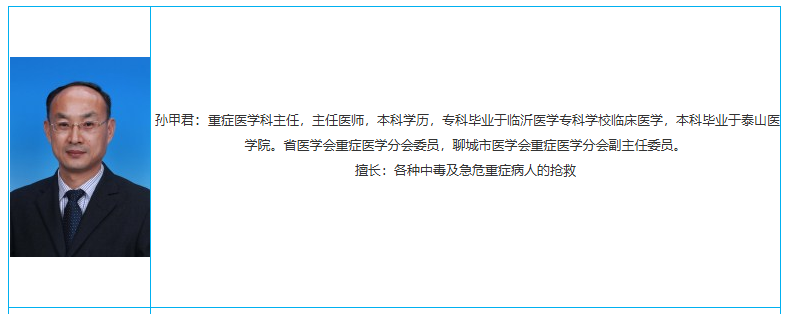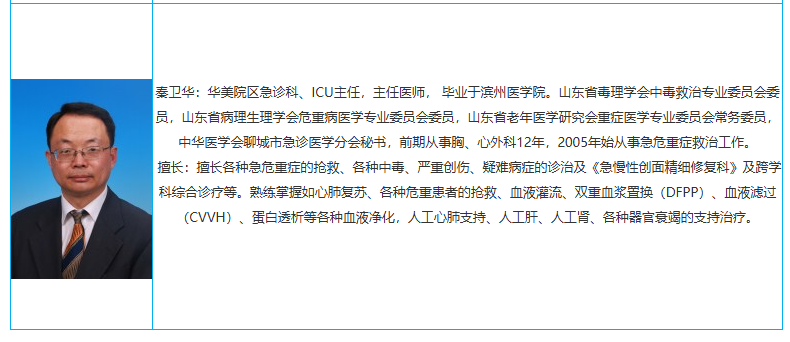- Date:2023-06-27
Department of Critical Care Medicine (Headquarter) Department Profile
The Department of Intensive Care Medicine (ICU) of Liaocheng Second People's Hospital was established in October 2005, which is a modernised and closed ICU, belonging to the first grade of the hospital and under the direct jurisdiction of the Department of Medical Affairs, with the name of the department in Chinese as "Department of Critical Care Diseases", which was unified and renamed as "Department of Intensive Care Medicine" in 2009. In 2009, the name of the department was changed to "Department of Critical Care Medicine". It is a specialised department for admitting and treating critically ill patients and carrying out advanced resuscitation, centralised treatment and guardianship for critically ill patients, and it is a specialised department for centralised guardianship and rescue of critically ill patients in the hospital.
The scope of admission and treatment of the department is as follows: 1. Acute organ failure that threatens the life of patients due to various reasons, such as respiratory failure, heart failure, shock, liver failure, renal failure, diffuse intravascular coagulation, cardiac arrest, etc.; 2. Post-operative recovery of general anaesthesia surgery patients as well as all kinds of high-risk patients who can reduce the risk of death by strengthening the supervision and treatment of ICU; 3. Acute exacerbation of chronic organ insufficiency can be recovered by strengthening the supervision and treatment of ICU. The acute exacerbation of chronic organ dysfunction can be restored to its original state through enhanced monitoring and treatment in ICU; 4. Patients with advanced malignant tumours are not admitted to the scope of ICU in principle.
At present, the Department of Intensive Care Medicine (the main hospital) has 25 sets of Myriad central monitoring systems and bedside imported Philip monitors, 1 mobile transport monitor, 21 sets of imported invasive and non-invasive ventilators, including 4 sets of ventilators with transport function; 3 sets of imported bedside haemofilters, 2 sets of fibre-optic bronchoscopes, 1 MAQUET Extracorporeal Membrane Lung Oxygenation (ECMO) Artificial Heart and Lung Centrifuge, 2 sets of high-flow wet therapy machines, 2 sets of subcooling machines, 2 sets of high-flow wet therapy machines, and 2 sets of high flow rate therapy machines, 2 sets of subcooling machine. 2 sets of therapeutic instrument, 3 sets of subcooling therapeutic instrument, 2 sets of bedside glucose meter, 1 set of cardiopulmonary resuscitator, 5 sets of anti-embolism pumps, 2 sets of bronchoscopes, 2 sets of GEM 4000 blood gas analysers, 3 sets of vibrating sputum expectorators, 36 sets of micro-injector pumps, 12 sets of nutrient infusion pumps, 9 sets of infusion pumps, 3 sets of bedside electrocardiogram machines and other advanced medical equipment, as well as the central air-conditioning, air-conditioning wards, the centre of oxygen, the centre of compressed air, the centre of suction, mobile check-ups and so on. In 2015, a high-specification mobile ICU (equipped with ventilator, monitor, defibrillator, negative-pressure suction, micro pump, infusion pump, etc.) was established to facilitate the transfer of patients with acute and critical illnesses in the neighbourhood.
In addition to continuous and dynamic vital signs monitoring, dynamic acid-base balance blood gas analysis monitoring, liver function monitoring, kidney function monitoring, blood glucose monitoring, immune function monitoring, nutritional status monitoring for all kinds of critically ill patients, the Department of Intensive Care Medicine is also capable of invasive arterial blood pressure monitoring and central venous pressure monitoring for those critically ill patients who are in need of such monitoring. Through dynamic and quantitative monitoring, we capture instantaneous changes in patients and take targeted treatment measures according to the changes to provide effective treatment and care for critically ill patients. Physicians at all levels are skilled in performing various kinds of arterial and venous puncture and intubation, rapid and skilled tracheal intubation, intubation difficulties through fibreoptic bronchoscope intubation and fibreoptic bronchoscopy deep sputum suctioning, alveolar lavage, and doctors and nurses have strong emergency response ability, and are able to respond quickly and accurately to all kinds of emergencies as well as all kinds of changes of the patients. We are skilled in applying various invasive and non-invasive mechanical ventilation techniques to treat patients with mechanical ventilation, applying blood purification techniques (including continuous bedside haemofiltration, haemoperfusion, plasma exchange, double plasma molecular adsorption DPMAS) to treat patients with various kinds of renal failure, hepatic failure, and various kinds of acute poisonings; and carrying out the application of VV-ECMO and VA-ECMO/VAV-ECMO to treat patients with persistent respiratory failure and chronic respiratory failure, as well as patients with chronic respiratory failure and chronic respiratory disease. VV-ECMO and VA-ECMO/ VAV-ECMO are applied to patients with persistent respiratory failure and/or persistent circulatory failure.
The Department of Critical Care Medicine (Headquarter) has 9 full-time physicians, including 1 chief physician, 1 deputy chief physician, 2 attending physicians, and 4 resident physicians; 29 nursing staff, including 6 nurse practitioners, 14 nurse practitioners, and 9 nurses.
Department of Critical Care Medicine (Hwamei Campus) Department Profile
Huamei ICU of Liaocheng City Second People's Hospital was established in 2016. It is located in the west of the 5th floor of the inpatient building of Huamei Hospital of Liaocheng City Second People's Hospital, with the director of the department: Qin Weihua, the deputy director: Li Yalin, and the head nurse: Liu Lijuan. There are 11 treatment beds, 8 treatment staff and 27 nursing staff.
The main types of diseases admitted to this department are cerebral haemorrhage, cerebral infarction, multiple injuries, severe infections, acute and chronic poisoning, refractory shock, postpartum haemorrhage, postpartum heart failure, eclampsia, postoperative monitoring, and multi-organ failure caused by various acute and chronic diseases, etc. In addition to conventional monitoring and treatment instruments, the department has 3 bronchoscopes, 2 blood purification machines, 1 bedside ultrasound machine, 1 cardiac output monitor, 2 visual laryngoscopes The department also has a number of cryotherapy machines and an ECMO machine (shared with the headquarter).
Among the therapeutic personnel of the department, there are 1 senior title, 2 vice senior titles, 3 intermediate titles, 2 junior titles, 5 physicians with master's degree and 3 physicians with bachelor's degree. The staff of the department has studied in national key hospitals for many times, including the Affiliated Hospital of Shanghai Jiaotong University, West China Hospital, Shandong Provincial Hospital, and the Second Affiliated Hospital of Zhengda. Two physicians were sent to visit and study in Germany and Britain, and many new technologies and projects were carried out, such as percutaneous tracheotomy, ECMO treatment of respiratory and circulatory failure, ultrasound-guided PICC tube, critical ultrasound assessment of circulatory function, subcooling treatment of malignant cerebral swelling, and blood purification treatment of infectious shock, which make the department experienced in treating all kinds of critical diseases with first-class technology. Since its establishment, it has carried out 2 provincial scientific research projects and 4 municipal scientific research projects, published more than 10 papers in national and core journals, and dispatched many times to support Wuhan, Shanghai and neighbouring counties and cities during the Xin Guan epidemic, and has been awarded the honorary title of advanced collective and advanced unit in fighting against the epidemic for many times.





 鲁ICP备11009722号-4
鲁ICP备11009722号-4 